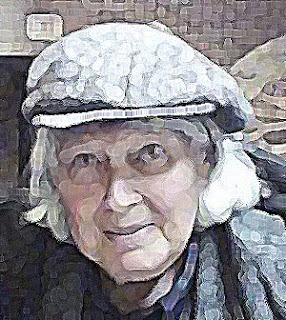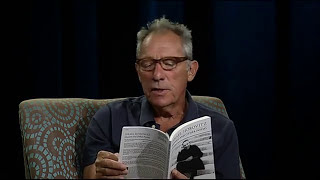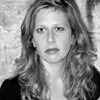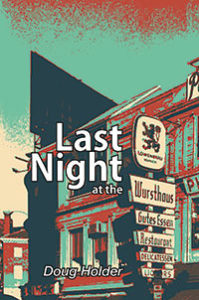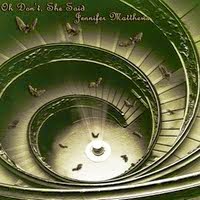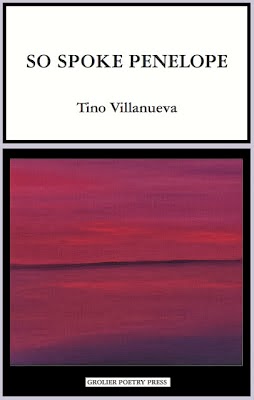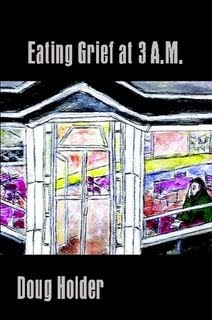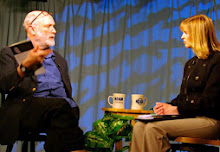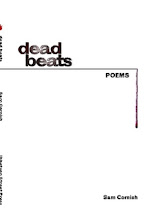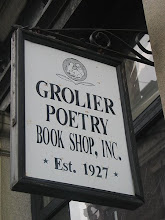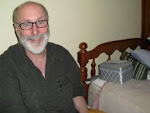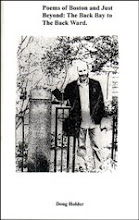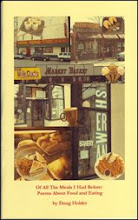Friday, September 02, 2011
"Poet and Polymath Hugh Fox"
I am reprinting an interview I did with Hugh Fox in 2008 that appeared in Reconfigurations magazine and " From the Paris of New England..."
Hugh Fox is in an hospice now, and is in the final stages of his battle with cancer.
"Poet and Polymath Hugh Fox"
Interview with Doug Holder
Poet and Polymath Hugh Fox: Still a Wunderkind at 76
At the Sherman Café in Union Square (Somerville, Mass.) I met poet, translator, critic, playwright, Hugh Fox and his wife, before a taping we were to do at Somerville Community Access TV of my show “Poet to Poet: Writer to Writer.” Fox was visiting his daughter who lives in Somerville and teaches at area universities. Two of my next-door neighbors Kirk and Lucy Etherton joined us as Fox held court. At age 76 Fox shows no signs of slowing down. He regaled us with stories of his extensive travels, all peppered with his vast wealth of knowledge of ancient Aztec culture, mythology, literature, and publishing. Fox talks like a Bronx cabdriver (decidedly from the side-of-his mouth), and he is not afraid to use, to put it mildly, unsavory language. My friend described him as “Larger than life.” And so he is.
Fox, who was a tenured professor at the Michigan State for well over 30 years, recently completed a controversial memoir “Way, Way Off the Road” (Ibbetson Street) that dealt with many of the figures from the small press movement, a movement that has produced thousands of small literary magazines and books, and is the lifeblood of poets and writers of all stripes.
Small Press books and magazines are typically defined as having press runs of less than 5,000. Fox has championed a movement that gave a start from everyone from Allen Ginsberg to Mark Doty.
Fox was a founding member of COSMEP, (a seminal small press organization), and he published the well-regarded literary magazine “Ghost Dance: The International Quarterly of Experimental Poetry,” (1968-1995). He is the recipient of two Fulbright Professorships and penned the first critical study of the dirty old man of literature himself, Charles Bukowski, as well as a critical study of the poet Lyn Lifshin. Fox was a founding editor of the Pushcart Prize, has written and published over 80 books and chapbooks of poetry, and has reviewed countless small press books for Len Fulton’s “Small Press Review.” Fox was the Latin American editor of the Western World Review & North American Review, and a former contributing reviewer on Smith/Pulpsmith magazine founded by Harry Smith.
* * *
Doug Holder: Hugh you wrote critical studies of Henry James and Charles Bukowski, two vastly different writers. Whom did you have the greater affinity for?
Hugh Fox: I got my PhD from the University of Illinois and my dissertation was on Edgar Allen Poe. I was raised as an Irish Catholic, and all I read was Irish Catholic literature. I had no idea what was in the outside world. I decided to take on Henry James because it would be an Americanization process and I thought I would learn to write novels. I did like James’ work a lot.
I never intended to get involved with Bukowski. I was totally academic. And then one day I was in this bookstore in Hollywood, the “Pickwick.” Anyway, I bought Bukowski’s book: “Crucifix and the Death Hand.” I got a hold of his press LouJon in New Orleans, and they told me to look him up in the phonebook. So I called him up and said: “This is Hugh Fox. I love your work. I want to meet you.” He said: “OK, come over tomorrow.” He was living in a motel in Hollywood. I talked with him a while. He took out these suitcases and there were all his books and magazines in them. He gave me five full suitcases and told me if I saw doubles to keep them. My entire way of seeing the world changed after this. Bukowski and Henry Miller were big influences of change for me.
DH: You were friends with Harry Smith, the book publisher, and founder of “The Smith…” magazine. Smith published such writers as: Duane Locke, Ruth Moon Kempher, John Bennett, Lloyd Van Brunt, Jeff Sorensen, Alan Britt, and Tristram Smith as well as my friends Luke Salisbury and Jared Smith. Can you talk about your relationship with Smith?
HF: I’ll tell you what happened. Smith had no money at all, and he meets Marian Pechak up in Rhode Island at Brown. So he marries her and her parents died and she got millions. So they move to Brooklyn Heights. They had a big Brownstone mansion. So Smith tells her he wants to be a publisher. His wife said:” Hey, we have the money do what you want to do”. So he started to publish. He had an office right by City Hall in New York City. I met Smith through COSMEP and used to go to Smith’s all the time. I went between semesters, and in the summer. I’d go for a month a year for twenty years. Smith published everyone who was anyone. I did a lot of reviews for him. He paid me—I stayed at his house—he set up the basement for me. We used to go out for lunch and dinner and his wife told the kids to call me: “Uncle Hugh.” I was closer to Smith than anyone else. Through him I met Menke Katz who was a great Yiddish writer.
DH: You edited the groundbreaking anthology “The Living Underground,” that our Boston Poet Laureate Sam Cornish was in. How did you get this collection together?
HF: It was formed due to my connection with COSMEP. This was the “Committee of Small Press Editors and Publishers.” Len Fulton and others formed it in the early 70’s. Len Fulton still runs the magazine “The Small Press Review” and “Dustbooks Publishing” in Paradise, California. COSMEP used to have annual conventions around the country: St. Paul, New York, and New Orleans. Every convention had a huge reading and almost every small press editor in the country was there. I got to meet all the writers and all the publishers and I got to know people in Boston, and of course Sam Cornish was in Boston, and as it happened he was included in “The Living Underground…” Cornish was at the convention in Boston.
DH: What is an “underground poet?”
HF: Someone who is not published by the big New York publishers.
DH: What was “groundbreaking” about the anthology?
HF: We had living, contemporary small press poets. We had folks like Charles Potts, Richard Krech, and many others. We had a reunion almost forty years later in Berkley, Ca.
DH: How did you get involved with the small press literary award the “Pushcart Prize?”
HF: I got involved through a COSMEP conference in New Orleans. The Prize doesn’t have as much impact as it did in the day. I go to a Barnes and Noble today and nobody is buying anything, everyone is there with his or her computer. Everyone is having coffee with his or her computers.
DH: Hugh you are the most prolific reviewer I know. How did you get involved with reviewing books, and why do you spend so much time on an activity that doesn’t provide you with monetary compensation?
HF: I became good friends with Len Fulton of the Small Press Review. Now, every four months or so I get a package of books to read. It’s good for me because I get to find out what’s going on with the poets. It influences my style—all these poets I read. It helps me get my name in the Small Press Review all the time. I want to be involved.
DH: Your are the doyen of the short review. How are you able to get to the essence of a book with such few words?
HF: Before I go to bed I always read a few things. Then I just react to it. It’s funny it is like I listen to an inner voice. The inner voice tells me what to write. The reason I got a degree in American Literature was really to learn how to write reviews of books. To react to books. My first draft of my Poe dissertation was horrible. My advisor said as much. He told me that I was going to write his way. He said: “You are going to react, feel, and so forth. I learned to react. I learned this from academic teaching.”
DH: You said you always considered yourself a wunderkind, a boy genius. How about now at 76?
HF: The same at 76. I haven’t aged mentally or psychologically. I’m still 26. I may have cancer of the prostate, arthritis, but my mind is the same. When I was in California recently I wrote 100 poems in two weeks.
DH: What do you want your legacy to be?
HF: I haven’t thought about it. I would like to see other people do the same thing. I want them to react to the world around them.
Boston Poet Laureate Sam Cornish’s ‘dead beats’: The magic of joining words
Boston Poet Laureate Sam Cornish’s ‘dead beats’:
The magic of joining words
by Michael T. Steffen
Words set together, that’s all poetry needs. Sam Cornish finds just two words, the title,‘dead beats’, to magnetize and entertain our attention, evoking foremost, for readers of poetry,the Beat poets of the 1950s and 60s, notably Ginsberg and Kerouac (and Marlon Brando and Thomas Wolfe!) whom Cornish visits in poems throughout the book.
But look back at that first word, ‘dead’. For poetry that loves paradox, reversals, contrariness, surprises, over- and understatements and everything turned around and on its head, the word ‘dead’ hints at something terribly vital. For poetry it does. Ever since David Ferry—hold on a second!—ever since Gilgamesh, Odysseus and Aeneas, long before Dante and Hamlet and Ezra Pound and Robert Pinsky, poetry has been sourcing from talks with and about the dead. Maybe the way all life does. Only poetry comes right out and says so.
Put the two words together, presto of the true ring of a commonplace term, and the next time you’re called a “dead beat” (poets and readers of poetry often disguise themselves as such to the perception of this agitated worldly world) have Sam Cornish’s book in your pocket and share the secret compliment with your smile. (“Beat,” also, is the word partner of “heart,” with which Cornish’s writing is always in rhythm.)
I wanted to walk readers to the front door of this book, not through the house. Yet here’s a peak at the poem, in astonishing phrases, ‘Getting a Life’ dedicated to Robert Creely:
the truth
on the floor
like scenes cut
from a movie
you miss them
there is nothing
to hold the
poem together
but his breath…
So Cornish’s magical ‘dead beats’ published by Ibbetson Street Press, those two words, the title wagging the dog (would poetry have it any other way?) held the book together and resonated from poem to poem as I read with relish.
‘dead beats’ by Sam Cornish
is available for $16 from
Ibbetson Street Press
25 School Street
Somerville, MA 02143
To order online go to http://lulu.com/ibbetsonpress
Sunday, August 28, 2011
Somerville Writer Tracy Strauss: Gets By With A Little Help Of Her Cat
Somerville Writer Tracy Strauss: Gets By With A Little Help Of Her Cat
By Doug Holder
Even though Tracy Strauss no longer technically lives in Somerville, (she is just over the border in the Republic of Cambridge); she is at heart a Somerville writer. She is an accessible woman with an open face and no discernible literary affectations. She lived in the 'Ville for 5 years, won a Somerville Arts Council fellowship for her poetry, and she continues to pound the keys of her laptop at the Diesel Cafe in Davis Square. Her work has appeared in the LYRICAL SOMERVILLE in the The Somerville News, as well as Somerville's independent literary journal IBBETSON STREET. In regard to her use of the Diesel as a writer's retreat of sorts she told me for some reason the din of the cafe helps her writing, " Chris Castellani, the director of GRUB STREET in Boston writes there all the time too. Maybe it is something about the atmosphere in which all these writers are present writing and creating throughout the cafe. It spurs us on I guess," she said.
Strauss, who recently completed a 5 year teaching stint at Emerson College in Boston will be teaching Writing at the New England Conservatory this fall. She is an accomplished writer and has been published in such journal as Solstice, Briar Cliff Review and Drunken Boat, to name just a few. Strauss had a residency at the prestigious writers' colony BREAD LOAF as well at the NORMAN MAILER WRITER'S COLONY, and is currently working with the best selling literary agent Kent D. Wolf of Global Literary who is shopping her memoir: HANNAH GRACE: HOPE, HEALING & A RESCUE CAT that involves healing from Post Traumatic Stress Syndrome with her real life rescue cat Hannah.
Strauss has been the victim of sexual abuse when she was much younger and a cat she brought home helped her heal. Strauss said: " Hannah had been traumatized in her past as well and was afraid of people. I was afraid of animals, especially dogs, so we both dealt with our issues through our relationship. "
I asked Strauss how hard was it for her to get an agent. As you would expect it ain't easy. She said: " I sent out 100 query letters. I networked at writers' conferences, I networked on Twitter, and on my blog. At one point I met Kaylie Jones (the daughter of James Jones " From Here to Eternity") and she helped me get the manuscript in shape to be marketed."
Although Strauss is concentrating on memoir writing she loves writing poetry. She finds it a great way to express herself. "It is a foundation for my prose," she reflected. "Poetry has a musicality to it and so should all writing to some extent."
Like many Somerville area writers Strauss is a hustler: teaching, writing, giving readings, her fingers dancing on the keyboard at the Diesel, and loving every minute of love it. I always say if you have passion for what you do--you are living a charmed life indeed.
From Here
I am able
to overlook
the track
where the
people run
in circles as
I have done so
many times
now
I rest, I breathe deeply
aware my knees have unshut
I sit on the
metal bleachers
high above
freed
for a moment my eyes
my mind transcends
I look out
beyond the rooted trees,
the American flag half-staff
tied to its hard silver pole
the chaotic city, my life’s upset
all so distant, all so close
my fingers fit between
each other, my knuckles
spread, I am able to
bend without breaking
my tightened frightened
cramped hands, open myself
as much as is possible
to this world given my body
and spirit’s painful past
my elbows slowly, shyly
show their pale, naked selves
my arms stretch forward, up
I reach for the sky –
the clouds are like closed eyelids
the lashes spilling streaks of light.
--
trace elements # 52 & # 830:
----------------------------------
"By associating with a cat, one only risks becoming richer." - Colette
"Until one has loved an animal, a part of one's soul remains unawakened."
- Anatole France
http://thehannahgracebook.wordpress.com/
Subscribe to:
Posts (Atom)
